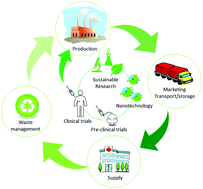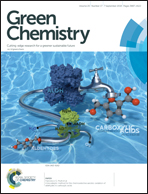Sustainable strategies for large-scale nanotechnology manufacturing in the biomedical field
Abstract
Nanoscience is a powerful tool to study matter at the scale where cooperative actions among atomic and molecular assemblies are effective, that is, in the nanometer range. Its application to technology is expected to bring new ways to improve our life by means of applications in fields such as environmental and materials science, pharmacy, and medicine. Given the progress in these areas, it is not too early to think in terms of large-scale production for nanotechnology-based products. At the same time, the consequence of a large-scale expansion of nanomanufacturing processes has not received sufficient attention so far, especially in terms of environmental impact. In this review, we highlight the issue of nanotechnology sustainability for biomedical applications. In particular, we discuss how (i) Life Cycle Assessment (LCA) models may help in guiding the choice of production processes; (ii) green chemistry can provide safe and environment friendly synthetic routes; and (iii) continuous flow methods may be implemented at large scale to give reproducible and highly controlled formulations for nanomedicine.



 Please wait while we load your content...
Please wait while we load your content...